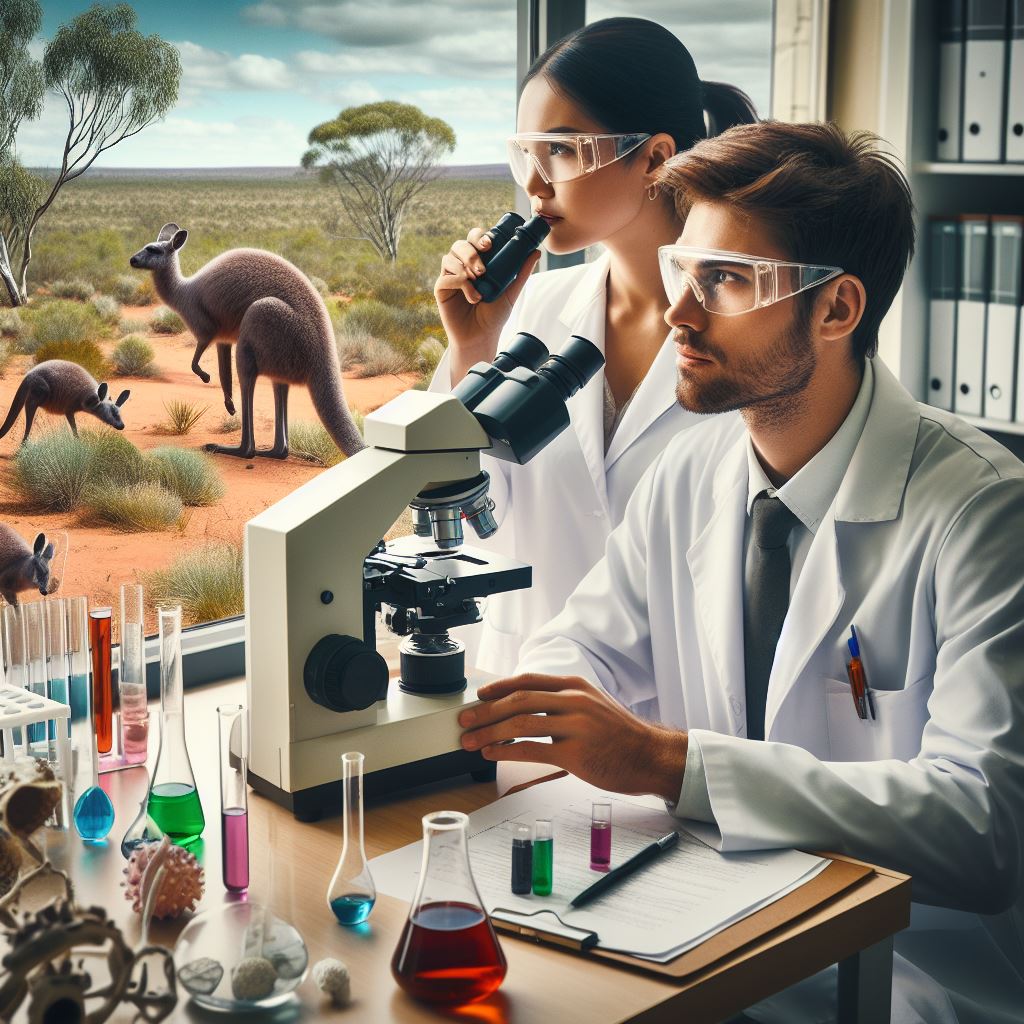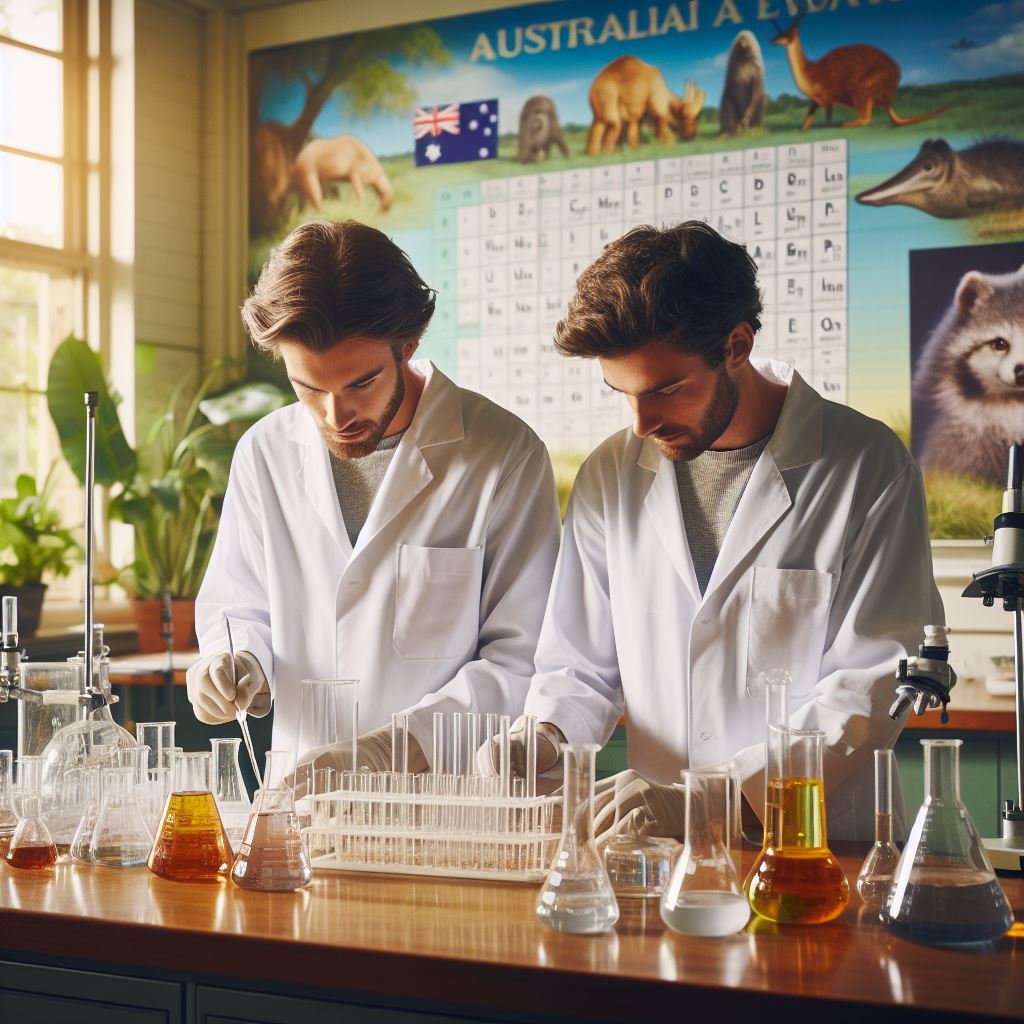Introduction
A day in the life of Aussie research pros is filled with intellectual pursuits and critical analyses. Their work is crucial in shaping policies, advancements, and innovation in Australia.
Research professionals in Australia play a pivotal role in driving progress and development in various disciplines.
Their expertise, dedication, and systematic approach contribute to the expansion of knowledge, addressing societal challenges, and strengthening the economy.
With their unwavering commitment to investigating, analyzing, and interpreting data, research pros provide valuable insights that aid decision-making processes.
Their findings serve as a foundation for evidence-based policies, ensuring informed choices for the betterment of society.
In addition, research pros in Australia foster collaboration and knowledge sharing among different stakeholders.
Through conferences, seminars, and workshops, they create platforms for exchange and learning, enhancing the overall research ecosystem.
Moreover, the significance of research pros extends beyond academic spheres. Their work influences industries, healthcare systems, environmental sustainability, and technological advancements.
The contributions made by research pros propel Australia to the forefront of global innovation and competitiveness.
As a result, the nation benefits from improved public health practices, efficient resource allocation, and the development of cutting-edge technologies.
The efforts of research pros have a profound impact on the lives of Australians, ensuring a brighter and more prosperous future.
Basically, research professionals in Australia play a vital role in advancing knowledge, shaping policies, and driving innovation. Their commitment, expertise, and findings positively impact various sectors, ultimately benefitting the entire nation.
Definition and Role of Research Pros
What a research pro is
A research pro is an individual who specializes in conducting research and analysis in various fields. They possess expertise in data collection, interpretation, and drawing conclusions.
They are skilled in designing research methodologies, selecting appropriate research tools, and organizing data. Research pros constantly stay updated on the latest research techniques and methodologies.
Overview of the responsibilities and duties of Research Pros
Conducting literature reviews
Research pros analyze existing academic literature to gain insights and understanding on a particular topic. They identify research gaps and formulate research questions.
Designing research studies
Research pros design research studies by creating a clear and concise research plan. They outline objectives, hypotheses, sampling procedures, and data collection techniques.
Collecting and analyzing data
Research pros gather data through surveys, interviews, experiments, or secondary sources. They use statistical software to analyze the collected data and identify patterns, trends, and relationships.
Ensuring research ethics
Research pros follow ethical guidelines when conducting their studies. They protect the privacy and confidentiality of participants, obtain informed consent, and ensure the integrity of the research process.
Writing research reports
Research pros communicate their findings through comprehensive research reports. They present the results, discuss their implications, and provide recommendations for further research or practical applications.
Your Personalized Career Strategy
Unlock your potential with tailored career consulting. Get clear, actionable steps designed for your success. Start now!
Get StartedCollaborating with teams
Research pros often work in interdisciplinary teams, collaborating with other researchers, statisticians, and subject matter experts. They coordinate efforts, share knowledge, and contribute to a collective research outcome.
Presenting findings
Research pros share their findings through presentations at conferences, seminars, and workshops. They explain their research methodology, results, and implications to peers and professionals in their field.
Continuous professional development
Research pros engage in continuous learning to enhance their skills and stay updated on advancements in their respective fields. They attend workshops, training programs, and conferences.
Consulting and advisory roles
Research pros may provide consultancy services to organizations, offering research-based advice and insights to address specific business or policy challenges.
Contributing to scientific knowledge
Research pros play a vital role in advancing scientific knowledge by conducting original research, publishing articles in academic journals, and contributing to the scholarly community.
Supporting evidence-based decision making
Research pros assist policymakers, businesses, and organizations by providing evidence-based insights to inform decision-making processes. They help address societal issues and contribute to evidence-based policies.
Generally, research pros are highly skilled individuals who play a critical role in advancing knowledge and understanding in various fields.
Their responsibilities and duties encompass designing research studies, collecting and analyzing data, ensuring ethical practices, and disseminating findings.
Through their continuous professional development, they contribute to the growth of their own expertise and the wider academic community.
Morning routine
Waking up and preparing for the day
In a typical day as an Aussie research professional, our morning routine begins with waking up refreshed and motivated for the day ahead.
We understand the importance of starting the day right, so we make it a priority to get enough sleep to feel energized.
Once we open our eyes, we greet the day with positivity and begin our morning rituals. This may include stretching, meditating, or engaging in some light exercise to awaken both our body and mind.
Taking care of our physical and mental well-being is crucial for maintaining productivity throughout the day.
Afterwards, we head into the bathroom to freshen up and prepare ourselves for the challenges that lie ahead.
We wash our faces, brush our teeth, and get dressed in our chosen attire, always mindful of maintaining a professional appearance.
Commuting to the workplace
With our morning routine done, it’s time to commute to the workplace. Depending on our location and personal preference, we may choose to drive, take public transportation, or even walk or cycle if the distance permits.
This time spent traveling allows us to mentally prepare and gather our thoughts for the day’s tasks.
During the commute, some of us take advantage of technology by listening to podcasts or audiobooks related to our fields of research. This helps us stay updated with the latest trends and developments in our respective areas of expertise.
Arriving at the office and settling in
As we arrive at the office, we greet our colleagues with a smile and exchange pleasantries. A positive work environment is essential for effective collaboration and teamwork.
We believe in fostering a supportive and friendly atmosphere where everyone feels valued and motivated.
Once settled in our workstations, we start by reviewing our to-do lists and prioritizing our tasks for the day.
With research being a multifaceted and complex field, it’s crucial to stay organized and focused to achieve our goals. We utilize digital tools and traditional pen-and-paper methods to plan our day effectively.
Stand Out with a Resume That Gets Results
Your career is worth more than a generic template. Let us craft a resume and cover letter that showcase your unique strengths and help you secure that dream job.
Get HiredBefore diving into our work, we take a few moments to check our emails and respond to any urgent messages. Communication is vital in our line of work, and we make sure to stay connected with colleagues, clients, and stakeholders throughout the day.
Once we have a clear idea of our priorities, we can start working on our ongoing research projects. This may involve conducting experiments, analyzing data, writing reports, or attending meetings with other researchers or collaborators.
Throughout the morning, we stay dedicated to our tasks, periodically taking short breaks to recharge and refresh our minds. Collaboration and brainstorming sessions are also scheduled, allowing us to bounce ideas off each other and foster innovative thinking.
As the morning comes to an end, we feel a sense of accomplishment knowing that we have made progress in our research journey. We take a brief pause to reflect on our achievements and set new goals for the rest of the day.
In summary, a day in the life of an Aussie research professional starts with a mindful morning routine, followed by a focused commute to the workplace and settling into a collaborative and vibrant office environment.
Our mornings set the tone for a productive day ahead, where we tackle complex research projects and contribute to the advancement of knowledge in our respective fields.
Read: The Future of Green Chemistry in Australia
Daily tasks and projects
Conducting literature reviews and background research
- Research pros engage in in-depth analysis of existing literature and conduct thorough background research.
- They stay updated with the latest studies and publications relevant to their field of research.
- Through literature reviews, they identify gaps in knowledge and areas that require further investigation.
- By thoroughly understanding existing research, they can build upon previous findings and contribute to the scientific community.
Collecting and analyzing data
- Research pros design and implement data collection methods suitable for their specific projects.
- They carefully collect and organize data, ensuring accuracy and reliability.
- Using statistical tools and techniques, they analyze the collected data to uncover patterns, trends, and correlations.
- Through data analysis, they derive meaningful insights that contribute to the advancement of knowledge.
Collaborating with team members and clients
- Effective collaboration is key to successful research projects.
- Research pros communicate and work closely with team members, exchanging ideas and insights.
- They also collaborate with clients, understanding their requirements and goals.
- By fostering a collaborative environment, they ensure synergy and maximize research outcomes.
Writing reports and presenting findings
- Documenting research findings is an integral part of a research pro’s daily tasks.
- They write comprehensive reports, summarizing their methodologies, results, and conclusions.
- Reports are often prepared in a clear and concise manner, presenting complex information in an accessible format.
- Research pros may also present their findings at conferences, seminars, or in client meetings.
These daily tasks and projects demonstrate the diverse and challenging nature of a research pro’s role.
From conducting literature reviews and collecting data to collaborating with team members and presenting findings, they constantly strive to expand knowledge and make valuable contributions to their field.
Read: Australian Women in Chemistry: Trailblazers
Challenges and Problem-Solving
Identification of common challenges faced by research pros
- Limited funding: Research professionals often face the challenge of securing adequate funding for their projects.
- Time constraints: Researchers need to manage their time efficiently to meet project deadlines.
- Data collection difficulties: Gathering accurate and reliable data can be challenging due to various factors.
- Ethical dilemmas: Research pros encounter ethical challenges when dealing with sensitive information or human subjects.
- Collaboration issues: Coordinating and collaborating with other researchers from different backgrounds can be challenging.
- Technical obstacles: Researchers often encounter technical difficulties related to equipment or software during their work.
Examples of problem-solving strategies used by research pros
- Seeking alternative funding sources: Researchers can explore grants, fellowships, or partnerships to secure additional funding.
- Prioritizing tasks: By creating a schedule or using project management tools, research pros can efficiently manage their time.
- Implementing robust data collection methods: Researchers can use multiple data collection techniques to ensure data accuracy.
- Adhering to ethical guidelines: Research professionals must follow ethical protocols and seek institutional approval when necessary.
- Establishing effective communication channels: Regular meetings and clear communication help overcome collaboration challenges.
- Technical support and troubleshooting: Research pros rely on IT support and expert consultations to resolve technical issues promptly.
Challenges and problem-solving are integral parts of the research journey for Australian research professionals.
Whether they specialize in pharmaceuticals, environmental studies, or social sciences, these experts navigate a range of hurdles to advance knowledge in their respective fields.
“Addressing Challenges in Research: Funding and Time Management”
Limited funding poses a significant challenge for research pros in Australia. With fierce competition for grants and limited resources, securing adequate funding becomes crucial.
To address this challenge, researchers often seek alternative funding sources such as national or international grants, private sponsorships, or industry partnerships.
Expanding their funding options enhances their chances of success in obtaining financial support for their work.
Time constraints are another common challenge faced by research professionals. Balancing multiple projects, administrative tasks, and collaborating with colleagues can be demanding.
To overcome this challenge, researchers prioritize tasks and create realistic timelines. Utilizing project management tools and setting achievable goals help them efficiently manage their time and meet project deadlines.
“Navigating Data Collection and Ethical Challenges in Research”
Data collection difficulties often arise during research projects. Factors such as limited access to population samples, technical glitches, or unanticipated events can hinder data collection.
Research pros employ various strategies to mitigate these challenges. They may use multiple data collection methods, conduct pilot studies, or collaborate with other institutions to ensure data accuracy and reliability.
Ethical dilemmas are an inherent part of research, and researchers often encounter ethical challenges while handling sensitive information or involving human subjects.
To address these issues responsibly, research professionals adhere to ethical guidelines and seek ethics committee approvals when necessary.
Respecting privacy, ensuring informed consent, and maintaining confidentiality are essential aspects of ethical research.
“Addressing Challenges in Research Collaboration and Technical Obstacles”
Collaboration issues can arise when research pros work with other researchers from diverse backgrounds. Differences in work styles, communication gaps, or conflicting opinions can hinder collaboration.
To overcome these challenges, research teams establish effective communication channels through regular meetings, utilizing collaboration platforms, or assigning clear roles and responsibilities.
Building a supportive and inclusive research environment fosters productive collaborations.
Transform Your LinkedIn for Maximum Impact
Elevate your professional brand with a LinkedIn profile that attracts recruiters, showcases your expertise, and maximizes opportunities. Stand out in your industry with a profile built for success.
Boost ProfileTechnical obstacles are a common challenge in the research field. Researchers heavily rely on technology, equipment, and software to collect and analyze data.
Technical difficulties can significantly disrupt their work progress. To address these issues, research pros seek technical support and consult experts to troubleshoot problems rapidly.
Staying updated with the latest technology trends and participating in relevant training workshops also enhance their technical skills.
In short, research professionals in Australia face various challenges in their day-to-day work.
Limited funding, time constraints, data collection difficulties, ethical dilemmas, collaboration issues, and technical obstacles are some of the hurdles they must overcome.
By employing problem-solving strategies such as seeking alternative funding, prioritizing tasks, implementing robust data collection methods, adhering to ethical guidelines, establishing effective communication.
And seeking technical support, these research pros navigate these challenges and contribute significantly to the advancement of knowledge.
Read: Must-Attend Chemistry Conferences in Aus

Networking and Professional Development
In order to stay current and connected in the world of research, Australian professionals prioritize networking and professional development.
They understand the importance of attending industry conferences and events, building relationships with colleagues and experts, and pursuing continuous education and training opportunities.
Attending Industry Conferences and Events
- Industry conferences and events provide invaluable opportunities for Aussie researchers to expand their knowledge and connect with like-minded professionals.
- By attending these gatherings, they stay up-to-date with the latest trends, breakthroughs, and research methodologies
- Active participation in conferences allows them to exchange ideas, receive feedback, and showcase their own work.
- These events also serve as platforms for networking, potentially leading to collaborations and career opportunities.
- Engaging with fellow attendees fosters a sense of community and enables the sharing of resources and expertise.
Building Relationships with Colleagues and Experts in the Field
- Aussie researchers understand the importance of establishing connections within their professional community.
- They actively seek out opportunities to engage with colleagues and experts in their field.
- Building relationships allows them to gain valuable insights, advice, and support from experienced professionals.
- Mentorship from established researchers enhances their own professional growth and development.
- Sharing knowledge and exchanging ideas strengthens the overall research ecosystem in Australia.
Pursuing Continuous Education and Training Opportunities
- Aussie research pros recognize that learning is a lifelong journey in their field.
- They proactively seek out continuous education and training opportunities to enhance their skills and knowledge.
- Participating in workshops, seminars, and webinars allows them to stay ahead in their research areas.
- Continuous education also enables them to remain adaptable in a rapidly evolving research landscape.
- Embracing new technologies and methodologies widens their expertise and strengthens their career prospects.
In general, Australian research professionals value networking and professional development to thrive in their field.
Attending industry conferences and events, building relationships with colleagues and experts, and pursuing continuous education and training opportunities are key elements of their successful careers.
By actively participating in these activities, they not only stay informed and connected but also contribute to the overall advancement of research in Australia.
Read: Innovative Chemistry Startups in Australia
You Might Also Like: AI in Australian Scientific Research
Discover More: Australian Biologists’ Role in Global Science
Delve into the Subject: Chemistry Job Market Outlook in Australia
Work-life balance
Achieving a work-life balance is crucial for research professionals to manage their workload and stress effectively.
Strategies for managing workload and stress
- Setting priorities and creating a schedule helps in managing multiple research tasks efficiently.
- Proper time management, delegation, and effective communication prevent work overload and burnout.
- Regular breaks during work hours rejuvenate the mind and enhance productivity.
- Seeking support from colleagues and mentors is essential in sharing responsibilities and reducing stress.
- Learning to say no when necessary helps in avoiding excessive work commitments and maintaining work-life balance.
Importance of balancing personal life and career as a research pro
Maintaining a healthy work-life balance is vital for the overall well-being and success of a research professional.
- Too much focus on work can lead to physical and mental health issues, affecting research quality.
- Stress and burnout can hinder creativity, motivation, and hinder professional growth.
- Having a fulfilling personal life promotes happiness, reduces stress, and improves overall job satisfaction.
- Balancing personal commitments can strengthen relationships, providing emotional support during work challenges.
- Taking time for oneself enhances self-care, boosts productivity, and prevents work-related exhaustion.
Examples of leisure activities and hobbies pursued by research pros
Research professionals engage in various leisure activities and hobbies to unwind and find inspiration outside of work.
- Exploring nature through hiking, gardening, or birdwatching provides a peaceful escape from daily research work.
- Participating in team sports like soccer or basketball fosters teamwork, socialization, and physical fitness.
- Engaging in creative pursuits like painting, writing, or playing a musical instrument stimulates the mind and promotes relaxation.
- Practicing mindfulness techniques such as meditation or yoga helps in reducing stress and increasing mental clarity.
- Volunteering for charitable organizations allows research professionals to give back to the community and gain a sense of fulfillment.
By actively pursuing leisure activities and hobbies, research professionals can maintain a healthy work-life balance, leading to increased job satisfaction and overall well-being.
You Might Also Like: Cultural Influence on AU Research
Conclusion
A day in the life of an Aussie research pro is filled with challenges, excitement, and constant learning.
Throughout the day, they dedicate their time to conducting experiments, analyzing data, and making groundbreaking discoveries.
They play a vital role in various sectors such as healthcare, technology, and environmental conservation.
Their research contributes to advancements in medicine, innovative technologies, and sustainable solutions to global issues.
As their journey comes to an end, it is evident that Aussie research pros are instrumental in shaping the future.
They are driven by curiosity, passion, and determination, and their dedication inspires others to pursue scientific endeavors.
In closing, the life of an Aussie research pro is a never-ending quest for knowledge and a quest that impacts society in countless ways.
So, let us celebrate the tireless efforts and invaluable contributions of these remarkable individuals!




